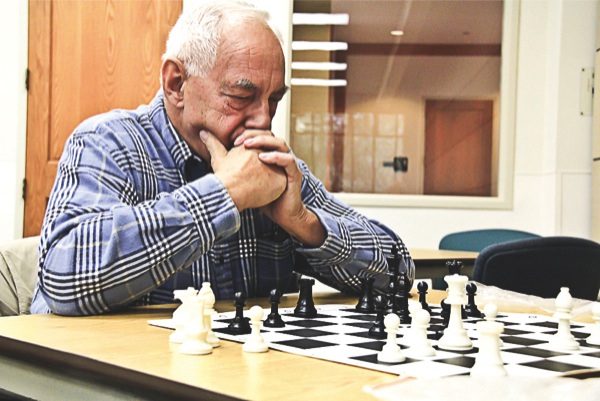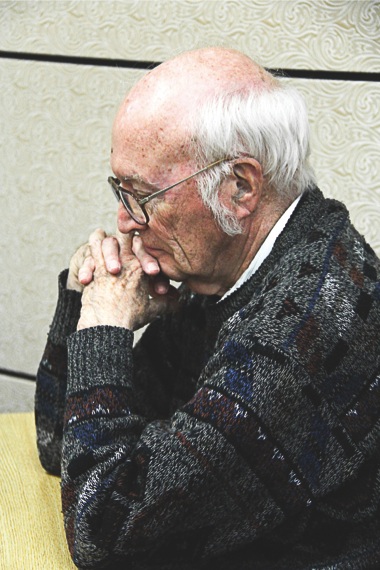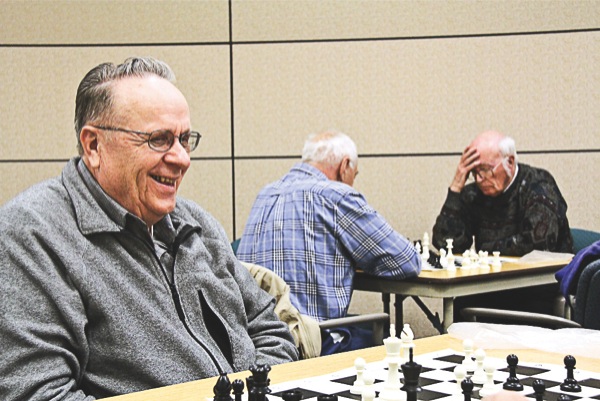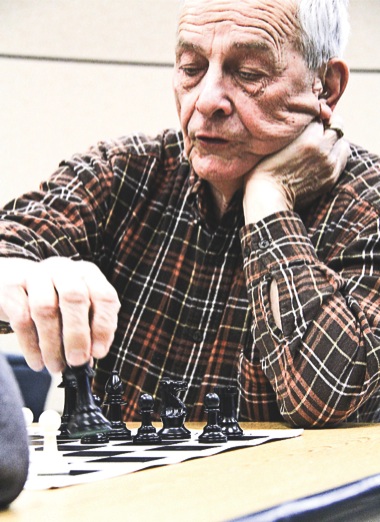SUN CITY – This is a yarn about chess. You know, that game that’s played by retirees on card tables and tree stumps in city parks, the game where American Bobby Fischer beat Russian Boris Spassky on an international stage in 1972, with a host of world media watching, mesmerized.
It’s the game that is a national hobby in Russia, a game the Internet claims is one of the most popular board games in the world (a claim that may be disputed in America). Its rules are simple, but it requires a high level of analytical, mathematical, and planning skills. It is a quiet, sometimes silent game, with serious players sitting very still at a table, staring at the board—for sometimes hours at a time. How many of you can correctly identify the various pieces of a chess set?

Chess Club members Bob Kries (above) and Bill Macomber (below) focus on their next moves. (Photos by Hannah Sturtecky/Sun Day)

In America, almost everyone has played a few games at one time or another, but relatively few have taken up the game seriously. Only one American, Fischer, has won a world championship. However, the game has become popular in the last decade in Illinois high schools.
The Illinois High School Association sponsors an annual tournament in which some 120 high school teams compete for trophies and medals. High schoolers call the game a sport, because competition is why they play.
Can you imagine nearly 1,000 teenagers in a large room silently playing a board game?
The game is sufficiently embedded in American culture, and so it was inevitable that a chess charter club would be started at Sun City. In 2004, several residents discovered they shared an interest in playing casually and socially. They held a meeting and reserved a room at Prairie Lodge. They don’t charge dues, they use their own paper boards and pieces, and they get together for informal play and socializing on Thursday evenings. The club has about 40-plus members, and an average of 6-12 players show up each week.
“We just set up a time and invite anyone to come and play,” Wayne Simons, vice president, said. “We don’t keep track of our play and who wins. We just spend time enjoying the game because it’s fun and creative.”
This writer was invited to come ask questions last week. I was hesitant at first because I suspected chess players didn’t want to be distracted while playing a game. But they cordially invited me to ask questions while they considered their moves.
Simons said, “We talk about all kinds of stuff while we play; we’re here to relax and enjoy friendly, casual competition.”

Chess Club vice president Wayne Simons (left) laughs over a joke his opponent made while Bob Kries (middle) and his opponent Bill Macomber (right) focus on their game. (Photo by Hannah Sturtecky/Sun Day)
In other words, casual, talking chess. In one match, the players talked freely about each other’s strategies and helped each other plan moves.
“I imagine you’re going to go there [a certain square] to put my king in check,” one said.
“That’s the plan,” responded the other.


Chess Club members contemplate moves ahead. (Photos by Hannah Sturtecky/Sun Day)
Most of these players learned and played the game when they were young, several in high school. Typically, they backed away from the game during their working careers and, now retired and with more time, have returned to it.
“I learned the game at a summer camp when I was young, and I liked it,” Bill Macomber, one of the original members who started the club, said. “But the game was not popular with most of my friends, and other sports and activities became popular.”
All of them remember following Bobby Fischer’s world championship games against Spassky in the early ’70s.
“I knew a guy who played against Fischer,” one player said. “He was a brilliant player, but arrogant and difficult to get along with. I remember when he died at age 64, some players commented how appropriate it was his that age matched the number of squares on a chess board.”
Fischer won the world Chess Federation title in 1972, but abdicated it in 1975, when federation officials didn’t meet his demands for future matches.
“It’s a ‘what if’ kind of game,” Simons said. “You ask yourself, ‘What will happen if I make this move?’ You try to think of all the possibilities, and if you think of six of them, your opponent might come up with the seventh one and beat you.”
“I thought my granddaughter might like the game, so I bought her a chess set, but she wasn’t interested in learning it,” Mike Elliott said. “I played after hours in high school and got to like the game. But as I got older, I didn’t play as much.”
“I played on the train coming home from work, with magnetic pieces,” Bob Kreis said. “I played a lot when Fischer played, because chess was more popular then. But I didn’t play much for many years, until I came to Sun City.”
“I played postal chess with a guy in Niagara Falls for a while, mostly by email,” Macomber said.
With the advent of the computer, players now play online and against a computer program. A chess website says computer chess has developed into a very high level of play.
Most historians agree that the game originated in the 6th century in India, spread in the next couple centuries to Persia and other Middle Eastern countries, and found its way to Europe in the middle ages. Early versions of the game were played by aristocrats and educated leaders. In Europe, the game became a part of the popular culture in Spain, France, and especially Germany, England, and Russia.
The modern version known today was developed in the late 19th century. The World Chess Federation was formed in the late 1800s and began developing worldwide tournaments and world championships. The term grandmaster is said to have been developed by the Tsar of Russia in the 19th century.
Bishops, knights, pawns, and rooks, anyone?




